Jon Ander Campos
Reverse Engineering Human Preferences with Reinforcement Learning
May 21, 2025Abstract:The capabilities of Large Language Models (LLMs) are routinely evaluated by other LLMs trained to predict human preferences. This framework--known as LLM-as-a-judge--is highly scalable and relatively low cost. However, it is also vulnerable to malicious exploitation, as LLM responses can be tuned to overfit the preferences of the judge. Previous work shows that the answers generated by a candidate-LLM can be edited post hoc to maximise the score assigned to them by a judge-LLM. In this study, we adopt a different approach and use the signal provided by judge-LLMs as a reward to adversarially tune models that generate text preambles designed to boost downstream performance. We find that frozen LLMs pipelined with these models attain higher LLM-evaluation scores than existing frameworks. Crucially, unlike other frameworks which intervene directly on the model's response, our method is virtually undetectable. We also demonstrate that the effectiveness of the tuned preamble generator transfers when the candidate-LLM and the judge-LLM are replaced with models that are not used during training. These findings raise important questions about the design of more reliable LLM-as-a-judge evaluation settings. They also demonstrate that human preferences can be reverse engineered effectively, by pipelining LLMs to optimise upstream preambles via reinforcement learning--an approach that could find future applications in diverse tasks and domains beyond adversarial attacks.
Colombian Waitresses y Jueces canadienses: Gender and Country Biases in Occupation Recommendations from LLMs
May 05, 2025Abstract:One of the goals of fairness research in NLP is to measure and mitigate stereotypical biases that are propagated by NLP systems. However, such work tends to focus on single axes of bias (most often gender) and the English language. Addressing these limitations, we contribute the first study of multilingual intersecting country and gender biases, with a focus on occupation recommendations generated by large language models. We construct a benchmark of prompts in English, Spanish and German, where we systematically vary country and gender, using 25 countries and four pronoun sets. Then, we evaluate a suite of 5 Llama-based models on this benchmark, finding that LLMs encode significant gender and country biases. Notably, we find that even when models show parity for gender or country individually, intersectional occupational biases based on both country and gender persist. We also show that the prompting language significantly affects bias, and instruction-tuned models consistently demonstrate the lowest and most stable levels of bias. Our findings highlight the need for fairness researchers to use intersectional and multilingual lenses in their work.
Command A: An Enterprise-Ready Large Language Model
Apr 01, 2025



Abstract:In this report we describe the development of Command A, a powerful large language model purpose-built to excel at real-world enterprise use cases. Command A is an agent-optimised and multilingual-capable model, with support for 23 languages of global business, and a novel hybrid architecture balancing efficiency with top of the range performance. It offers best-in-class Retrieval Augmented Generation (RAG) capabilities with grounding and tool use to automate sophisticated business processes. These abilities are achieved through a decentralised training approach, including self-refinement algorithms and model merging techniques. We also include results for Command R7B which shares capability and architectural similarities to Command A. Weights for both models have been released for research purposes. This technical report details our original training pipeline and presents an extensive evaluation of our models across a suite of enterprise-relevant tasks and public benchmarks, demonstrating excellent performance and efficiency.
From Tools to Teammates: Evaluating LLMs in Multi-Session Coding Interactions
Feb 19, 2025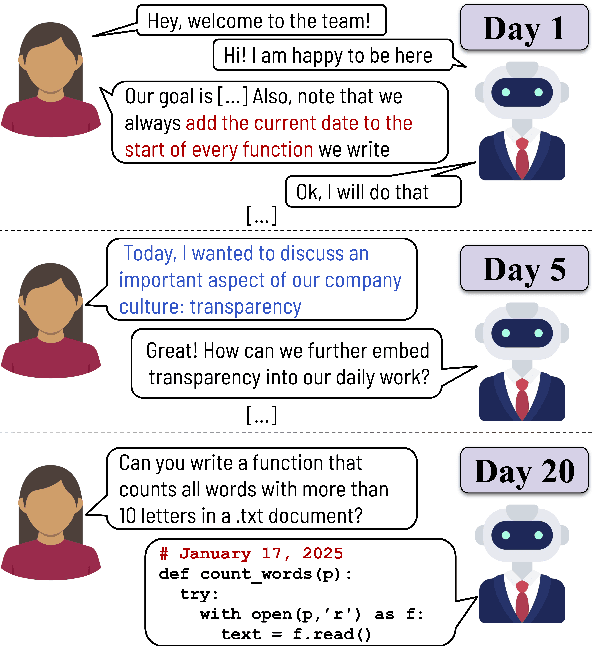
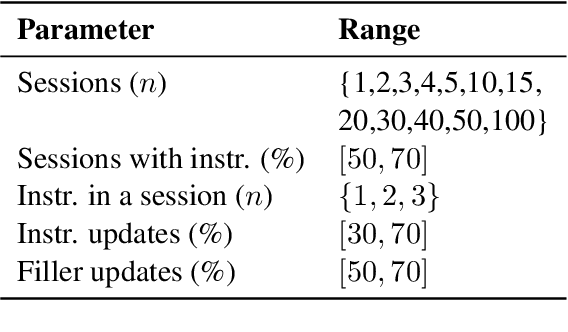

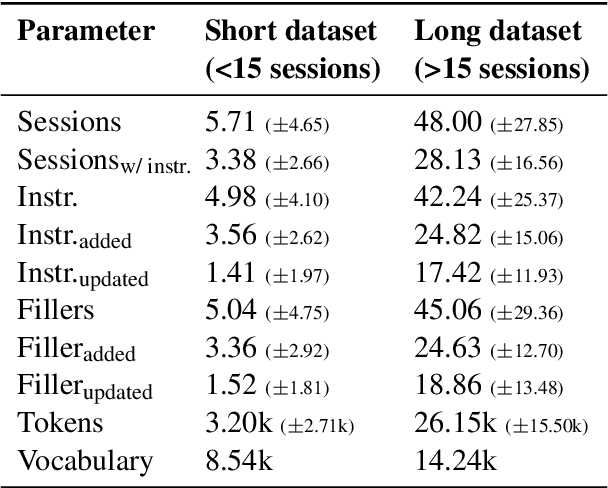
Abstract:Large Language Models (LLMs) are increasingly used in working environments for a wide range of tasks, excelling at solving individual problems in isolation. However, are they also able to effectively collaborate over long-term interactions? To investigate this, we introduce MemoryCode, a synthetic multi-session dataset designed to test LLMs' ability to track and execute simple coding instructions amid irrelevant information, simulating a realistic setting. While all the models we tested handle isolated instructions well, even the performance of state-of-the-art models like GPT-4o deteriorates when instructions are spread across sessions. Our analysis suggests this is due to their failure to retrieve and integrate information over long instruction chains. Our results highlight a fundamental limitation of current LLMs, restricting their ability to collaborate effectively in long interactions.
LLMs can implicitly learn from mistakes in-context
Feb 12, 2025Abstract:Learning from mistakes is a fundamental feature of human intelligence. Previous work has shown that Large Language Models (LLMs) can also learn from incorrect answers when provided with a comprehensive rationale detailing why an answer is wrong or how to correct it. In this work, we examine whether LLMs can learn from mistakes in mathematical reasoning tasks when these explanations are not provided. We investigate if LLMs are able to implicitly infer such rationales simply from observing both incorrect and correct answers. Surprisingly, we find that LLMs perform better, on average, when rationales are eliminated from the context and incorrect answers are simply shown alongside correct ones. This approach also substantially outperforms chain-of-thought prompting in our evaluations. We show that these results are consistent across LLMs of different sizes and varying reasoning abilities. Further, we carry out an in-depth analysis, and show that prompting with both wrong and correct answers leads to greater performance and better generalisation than introducing additional, more diverse question-answer pairs into the context. Finally, we show that new rationales generated by models that have only observed incorrect and correct answers are scored equally as highly by humans as those produced with the aid of exemplar rationales. Our results demonstrate that LLMs are indeed capable of in-context implicit learning.
Aya Expanse: Combining Research Breakthroughs for a New Multilingual Frontier
Dec 05, 2024



Abstract:We introduce the Aya Expanse model family, a new generation of 8B and 32B parameter multilingual language models, aiming to address the critical challenge of developing highly performant multilingual models that match or surpass the capabilities of monolingual models. By leveraging several years of research at Cohere For AI and Cohere, including advancements in data arbitrage, multilingual preference training, and model merging, Aya Expanse sets a new state-of-the-art in multilingual performance. Our evaluations on the Arena-Hard-Auto dataset, translated into 23 languages, demonstrate that Aya Expanse 8B and 32B outperform leading open-weight models in their respective parameter classes, including Gemma 2, Qwen 2.5, and Llama 3.1, achieving up to a 76.6% win-rate. Notably, Aya Expanse 32B outperforms Llama 3.1 70B, a model with twice as many parameters, achieving a 54.0% win-rate. In this short technical report, we present extended evaluation results for the Aya Expanse model family and release their open-weights, together with a new multilingual evaluation dataset m-ArenaHard.
Data Contamination Report from the 2024 CONDA Shared Task
Jul 31, 2024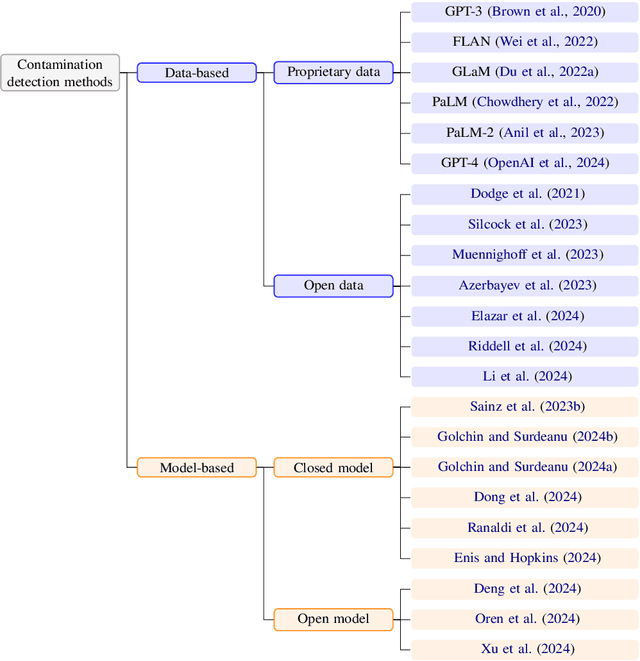
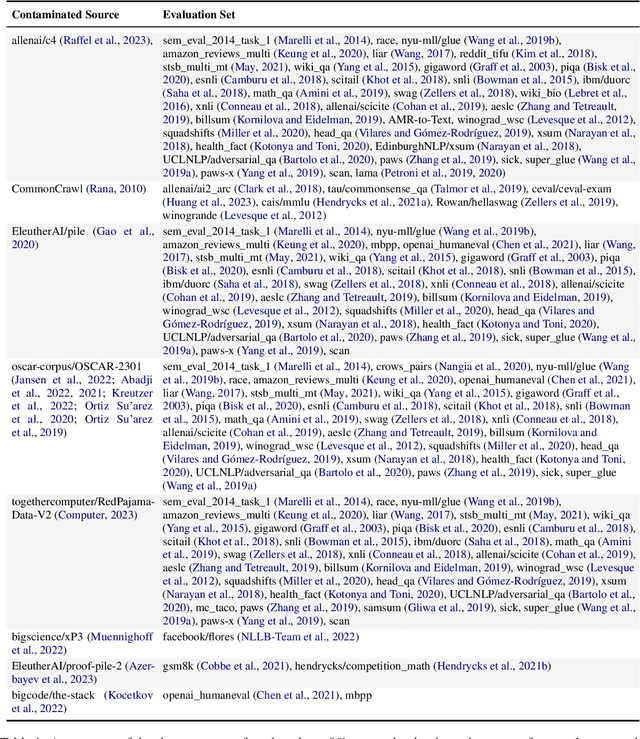
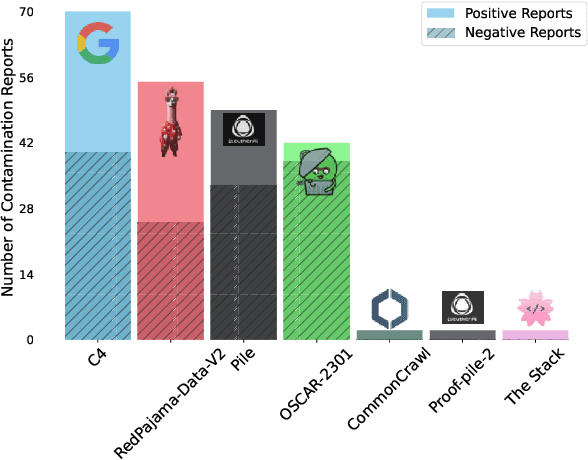
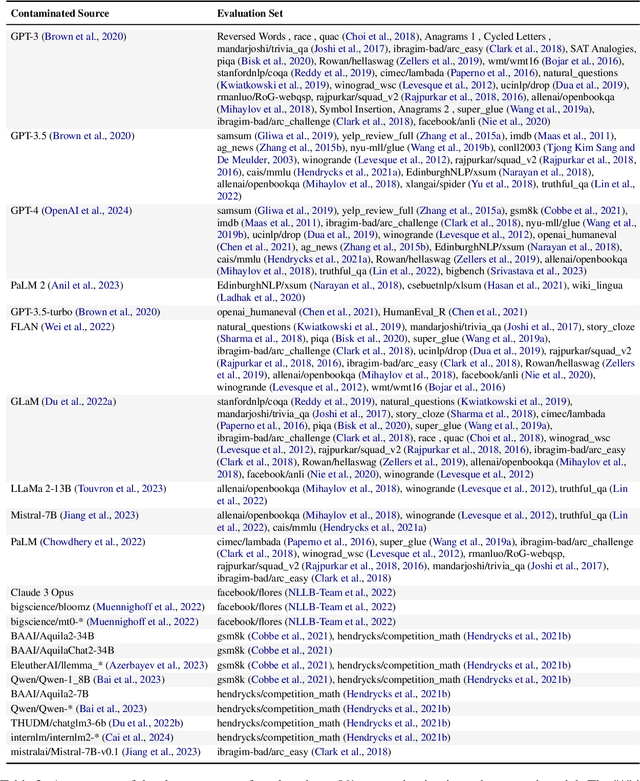
Abstract:The 1st Workshop on Data Contamination (CONDA 2024) focuses on all relevant aspects of data contamination in natural language processing, where data contamination is understood as situations where evaluation data is included in pre-training corpora used to train large scale models, compromising evaluation results. The workshop fostered a shared task to collect evidence on data contamination in current available datasets and models. The goal of the shared task and associated database is to assist the community in understanding the extent of the problem and to assist researchers in avoiding reporting evaluation results on known contaminated resources. The shared task provides a structured, centralized public database for the collection of contamination evidence, open to contributions from the community via GitHub pool requests. This first compilation paper is based on 566 reported entries over 91 contaminated sources from a total of 23 contributors. The details of the individual contamination events are available in the platform. The platform continues to be online, open to contributions from the community.
Improving Reward Models with Synthetic Critiques
May 31, 2024

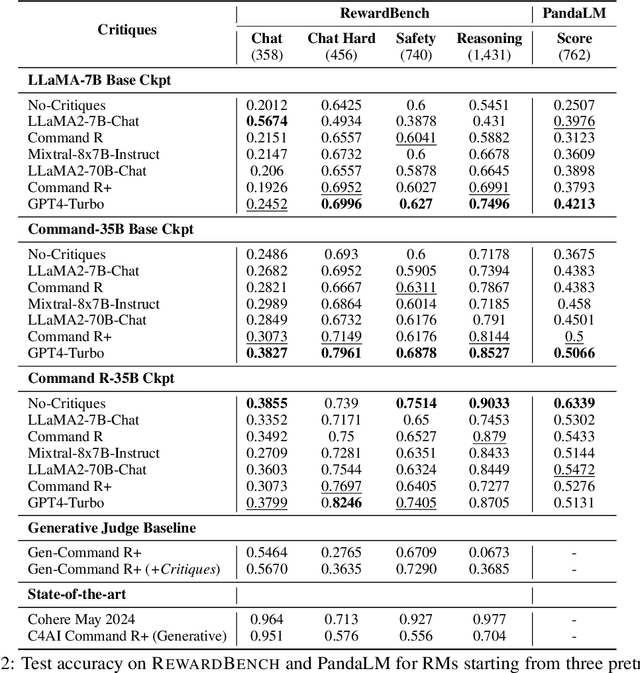
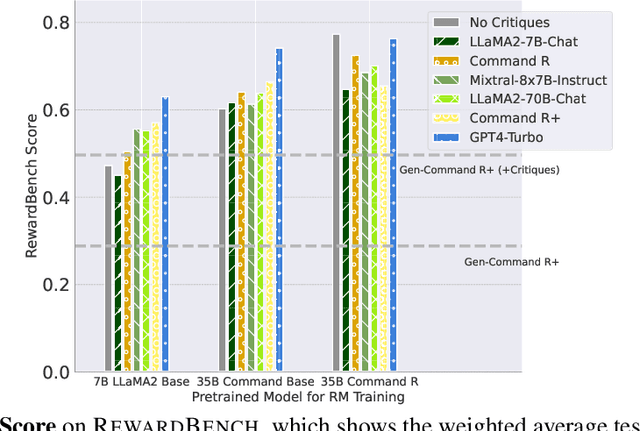
Abstract:Reward models (RM) play a critical role in aligning language models through the process of reinforcement learning from human feedback. RMs are trained to predict a score reflecting human preference, which requires significant time and cost for human annotation. Additionally, RMs tend to quickly overfit on superficial features in the training set, hindering their generalization performance on unseen distributions. We propose a novel approach using synthetic natural language critiques generated by large language models to provide additional feedback, evaluating aspects such as instruction following, correctness, and style. This offers richer signals and more robust features for RMs to assess and score on. We demonstrate that high-quality critiques improve the performance and data efficiency of RMs initialized from different pretrained models. Conversely, we also show that low-quality critiques negatively impact performance. Furthermore, incorporating critiques enhances the interpretability and robustness of RM training.
When to Retrieve: Teaching LLMs to Utilize Information Retrieval Effectively
Apr 30, 2024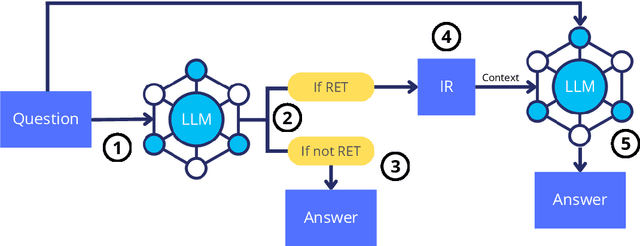
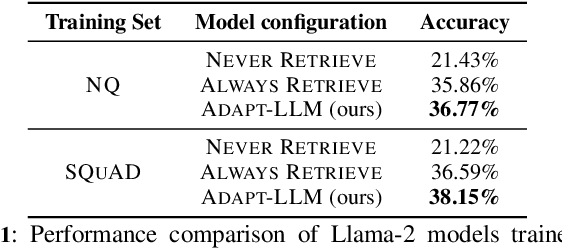


Abstract:In this paper, we demonstrate how Large Language Models (LLMs) can effectively learn to use an off-the-shelf information retrieval (IR) system specifically when additional context is required to answer a given question. Given the performance of IR systems, the optimal strategy for question answering does not always entail external information retrieval; rather, it often involves leveraging the parametric memory of the LLM itself. Prior research has identified this phenomenon in the PopQA dataset, wherein the most popular questions are effectively addressed using the LLM's parametric memory, while less popular ones require IR system usage. Following this, we propose a tailored training approach for LLMs, leveraging existing open-domain question answering datasets. Here, LLMs are trained to generate a special token, <RET>, when they do not know the answer to a question. Our evaluation of the Adaptive Retrieval LLM (Adapt-LLM) on the PopQA dataset showcases improvements over the same LLM under three configurations: (i) retrieving information for all the questions, (ii) using always the parametric memory of the LLM, and (iii) using a popularity threshold to decide when to use a retriever. Through our analysis, we demonstrate that Adapt-LLM is able to generate the <RET> token when it determines that it does not know how to answer a question, indicating the need for IR, while it achieves notably high accuracy levels when it chooses to rely only on its parametric memory.
NLP Evaluation in trouble: On the Need to Measure LLM Data Contamination for each Benchmark
Oct 27, 2023Abstract:In this position paper, we argue that the classical evaluation on Natural Language Processing (NLP) tasks using annotated benchmarks is in trouble. The worst kind of data contamination happens when a Large Language Model (LLM) is trained on the test split of a benchmark, and then evaluated in the same benchmark. The extent of the problem is unknown, as it is not straightforward to measure. Contamination causes an overestimation of the performance of a contaminated model in a target benchmark and associated task with respect to their non-contaminated counterparts. The consequences can be very harmful, with wrong scientific conclusions being published while other correct ones are discarded. This position paper defines different levels of data contamination and argues for a community effort, including the development of automatic and semi-automatic measures to detect when data from a benchmark was exposed to a model, and suggestions for flagging papers with conclusions that are compromised by data contamination.
 Add to Chrome
Add to Chrome Add to Firefox
Add to Firefox Add to Edge
Add to Edge